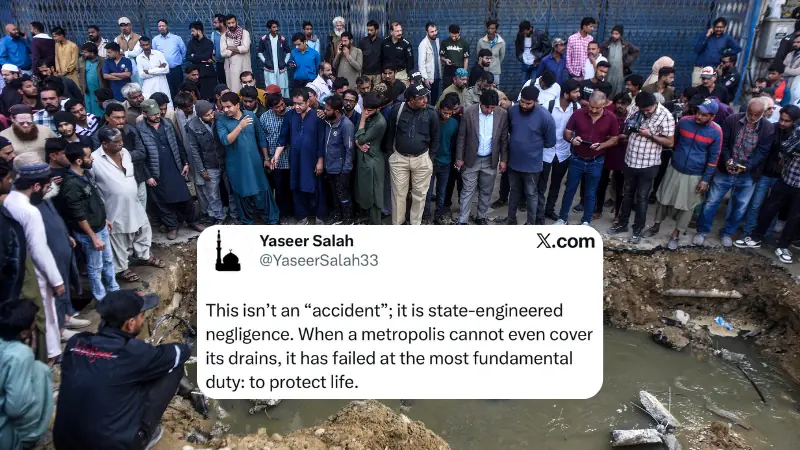Asif Farrukhi's students remember his kindness and marvel beyond the classroom
As the clock struck 8:50 am, I rushed my way towards Pakistan and Modern South Asia, a class that unpacked what Partition meant for this country.
I was twenty minutes late, and he would probably ask me to leave, but I had to pass my course and attendance was necessary.
It was when I was halfway to my seat, that I heard a voice say, “Who was Arundhati Roy, Yusra?” and I realised this was my new professor, waiting as all eyes were on me. I answered, he nodded in approval and I breathed a sigh of relief.
When the class was dismissed, he stopped me at the door and handed a book to me. “Maine dekha tha aap library mein dhoond rahi thi," (I saw you searching for it at the library) he said. It was Arundhati Roy. This was my first encounter with Asif sahab, the professor, the legend – forgiving, and nurturing.
Asif sahab was most popular for his iconic Jehan-e-Urdu, a curriculum that ravished his students with the riches of both, traditional and modern Urdu Literature, reviving love for the national language little by little, even for those who initially rebelled against it.

“All my life, teachers made me feel stupid for not being great at Urdu,” said Meher Malik, as she recalled his kindness and patience.
“But Asif sahab was really something else. He made an effort with me, never once giving up. On one occasion, he let me use Google translate in the exam because he did not want me to be intimidated by the language, he wanted me to befriend it. For someone who was trying to get out of the course, he eventually made me fall in love with it.”
His classes were extraordinary, as was his teaching style. His students often cherished the “outings” he would plan. Sometimes seamlessly strolling through the intoxicating fumes surrounding Urdu Bazaar, and other times, thriving under the full moon, pleasant breeze, accompanying garam garam doodh patti complete with a magnificent view of Quaid’s Mazaar.
On one such generous evening full of compositions and conversations, Safia Siddiqui recalls moments of playful encouragement.

“When it was time to leave, Asif sahab came out to see off my friend and I, making sure that Ajmal bhai who was there to pick us up, really was Ajmal bhai.
As we laughed over something, he turned to Insia who was laughing out loud like she always does covering her teeth, and said, 'Itni achi hassi hai, haath kyun rakh leti ho!' (Your smile is so beautiful, why do you cover it up?) and then went on to mention how his daughter also had a nice laugh, but usually kept a sombre face like Insia.”
This was Asif sahab for you, radiantly oscillating between the many roles he played for you; the professor, the mentor, the friend, the father. He was a man full of tones and expressions, emotions and connections – almost as if he knew exactly the importance of sustaining close relationships from his years of experience and recollections.
I often wondered if his empathy came from acknowledging the pains of Partition – the tales he relived, the trauma he absorbed, his eyes glistening and shining with the ghazals he often recalled.
Maybe this is why he was a man whose selfless warmth and compassion were poured in abundance for those who he loved like his own. All you had to do, was knock at his door – and the man who was honoured with the Tamgha-e-Imtiaz, would have words of wisdom readily available for your sensitive bone.

“His presence was enough for me to know, no matter how many times I break down, Asif sahab will be there to pick me up,” grieved a heartbroken Farwa Naqvi, as she shared the multitude of roles the professor played in her life.
Like her, many others would walk out in a daze, because as chivalrous as he was, every time you spoke to Asif sahab, he would look understandingly in your eye, and hold his gaze.
You could forget you, but Asif Sahab would always remember you.
"I had completely forgotten about an event with Shakil sahab, Hasina Moin sahiba, and Noor Ul Huda Shah," recalls Ali Rizvi. “When he sent a bunch of students to come looking for me in the library. As usual, he not only introduced me, but praised me extravagantly. Itni tareef karte thay ke sharmindgi hojati thi. (He used to praise one so much, it was almost embarrassing.) Once when he hugged me, his eyes were watery. He said to me, you're my son.”
And it's true. The legend that Asif sahab was, he not only encouraged, but always celebrated you. Co-founder of the Karachi Literature Festival, writer of six shot story collections, but himself so magnanimous, yet so humble.
One of the very few professors who was open to sharing his network, or introduce you to anyone and everyone he knew you looked up to. Like Kamila Ansari recalled, “A larger than life personality, and one of the very few who had the ability of making his way into the hearts of each and every person he knew.”

Asif sahab was a man generous in his praise, as was he a man eloquent, witty and lively in his demeanour. His knowledge of the literary landscape of Pakistan was unparalleled, and he seemed to captivate every classroom he entered.
Even those who weren’t his students, are left spellbound with the wisps of his humility, knowledge and greatness of persona, during the immense loss.
“I had invited Asif sahab for a festival at my university. Given his stature, I was apprehensive if he would even accept my invite. But not only did he attend, he also came to the rescue when things did not go as planned,” shared Jarrar Bukhari, a student in Lahore.
“He didn’t know me personally at that time but the way he connected with me felt like we knew each other for years. Whenever we met, he made sure to introduce me to poets and authors. He became my go-to person whenever I needed any reference, review, book, or to just to talk about the pleasures of reading.”
Like him, Kazim Rizvi too felt the loss was personal.
"He was a dear friend I knew I could always count on. When the news broke out, I immediately called on his number, hoping he would pick up and say "People would put up anything on social media. So unfortunate for them, I am still here." But the response was devastating. "I hung up and sat for a while completely blank. It was that moment I realised, he had been my guiding light."

As I read the numerous accounts of Asif sahab’s wholesome interactions, I truly recall him as a literary giant – charismatic yet carefree.
He left the perks of his UN job, to offer his extraordinary contribution and touch the lives of so many, who without him, would never understand the joys of devouring a great novel, evening breeze and a cup of cardamom tea.
As I see many shedding tears at his unfortunate demise, I picture him enjoying an endless library. His distant voice echoing the shelves, addressing everyone whose heart is aching, “Mushkil hai, par karna toh parega.” (It's tough, but has to be done.)











Comments